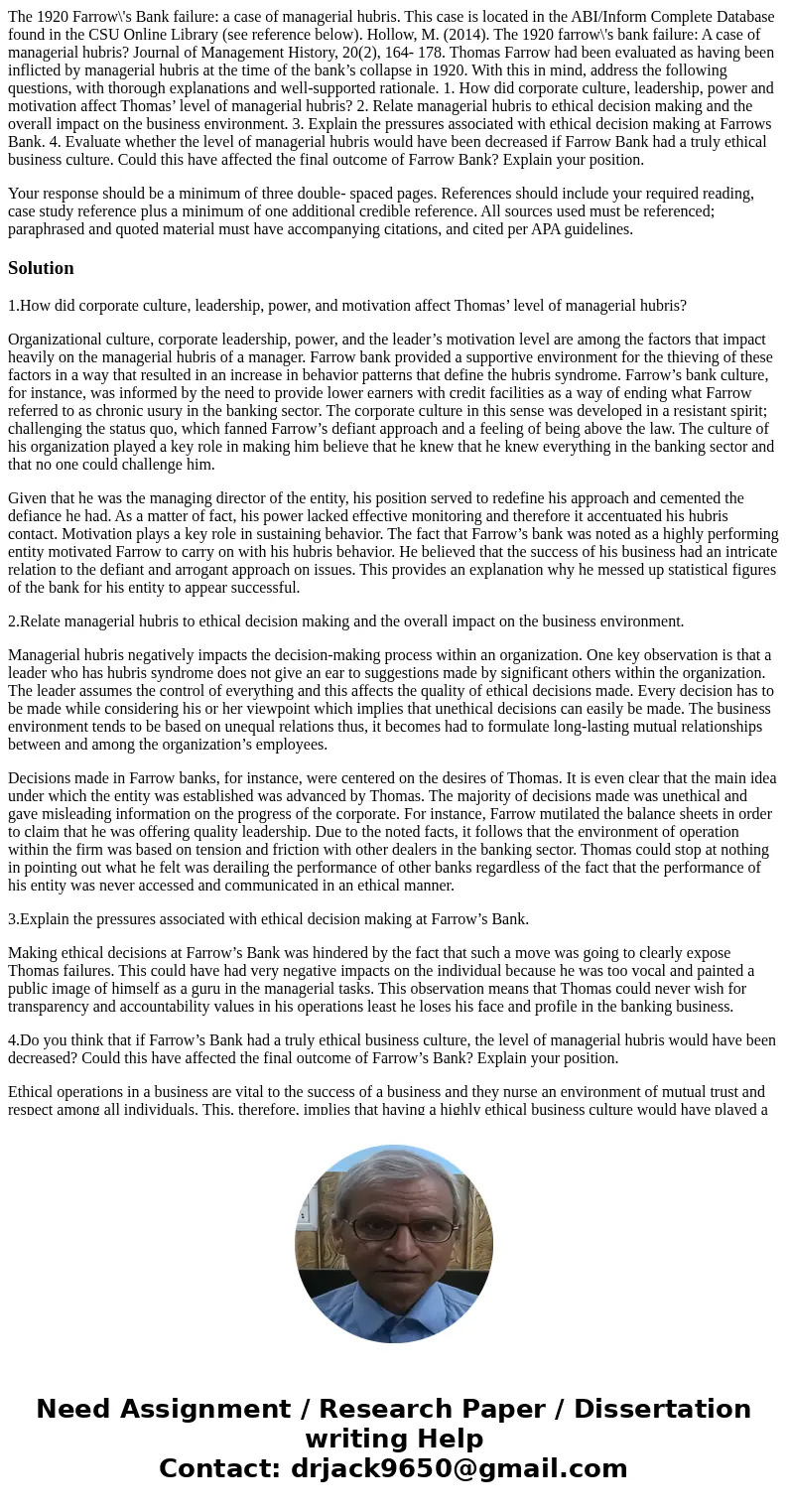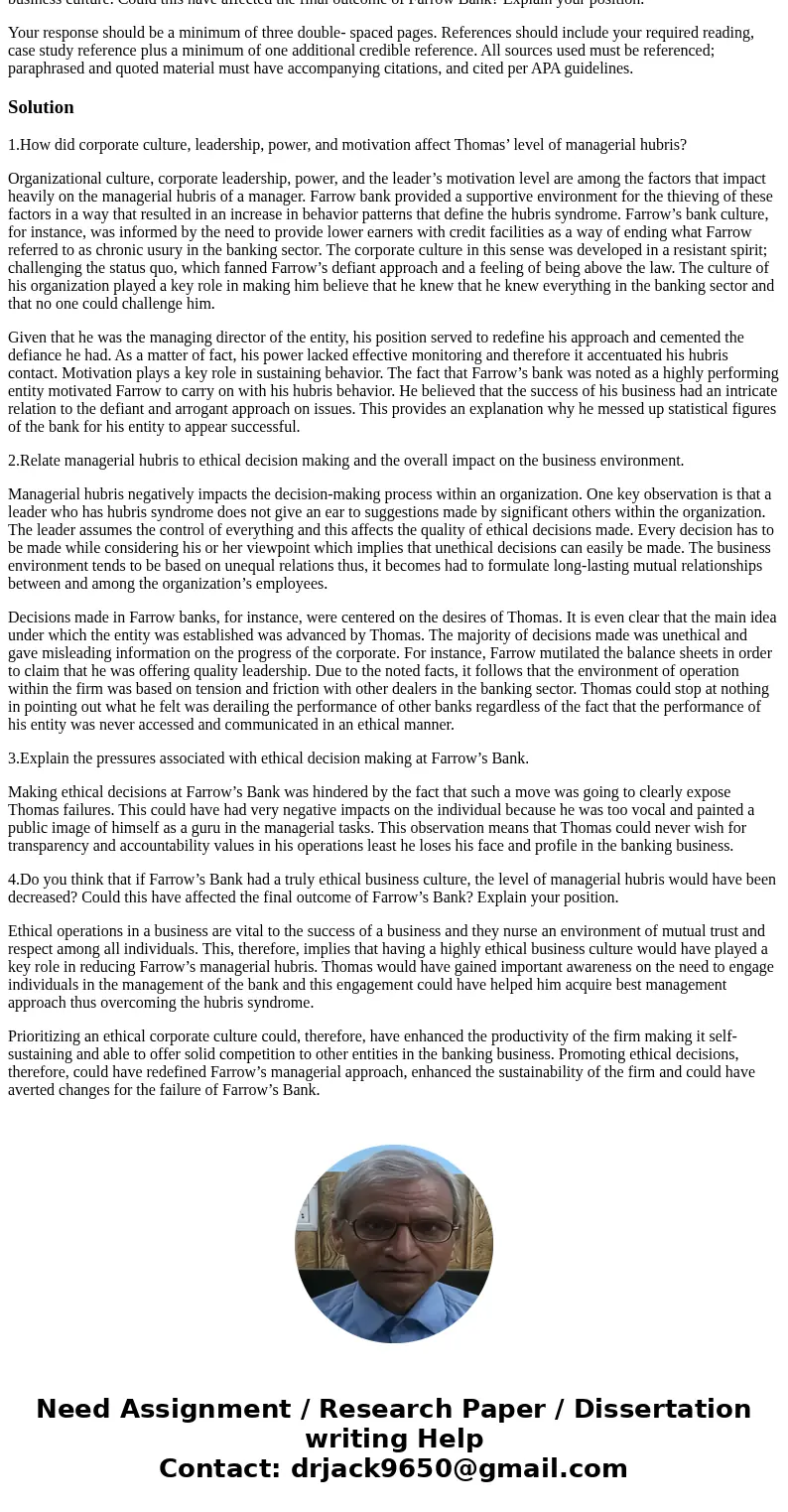The 1920 Farrows Bank failure a case of managerial hubris Th
The 1920 Farrow\'s Bank failure: a case of managerial hubris. This case is located in the ABI/Inform Complete Database found in the CSU Online Library (see reference below). Hollow, M. (2014). The 1920 farrow\'s bank failure: A case of managerial hubris? Journal of Management History, 20(2), 164- 178. Thomas Farrow had been evaluated as having been inflicted by managerial hubris at the time of the bank’s collapse in 1920. With this in mind, address the following questions, with thorough explanations and well-supported rationale. 1. How did corporate culture, leadership, power and motivation affect Thomas’ level of managerial hubris? 2. Relate managerial hubris to ethical decision making and the overall impact on the business environment. 3. Explain the pressures associated with ethical decision making at Farrows Bank. 4. Evaluate whether the level of managerial hubris would have been decreased if Farrow Bank had a truly ethical business culture. Could this have affected the final outcome of Farrow Bank? Explain your position.
Your response should be a minimum of three double- spaced pages. References should include your required reading, case study reference plus a minimum of one additional credible reference. All sources used must be referenced; paraphrased and quoted material must have accompanying citations, and cited per APA guidelines.
Solution
1.How did corporate culture, leadership, power, and motivation affect Thomas’ level of managerial hubris?
Organizational culture, corporate leadership, power, and the leader’s motivation level are among the factors that impact heavily on the managerial hubris of a manager. Farrow bank provided a supportive environment for the thieving of these factors in a way that resulted in an increase in behavior patterns that define the hubris syndrome. Farrow’s bank culture, for instance, was informed by the need to provide lower earners with credit facilities as a way of ending what Farrow referred to as chronic usury in the banking sector. The corporate culture in this sense was developed in a resistant spirit; challenging the status quo, which fanned Farrow’s defiant approach and a feeling of being above the law. The culture of his organization played a key role in making him believe that he knew that he knew everything in the banking sector and that no one could challenge him.
Given that he was the managing director of the entity, his position served to redefine his approach and cemented the defiance he had. As a matter of fact, his power lacked effective monitoring and therefore it accentuated his hubris contact. Motivation plays a key role in sustaining behavior. The fact that Farrow’s bank was noted as a highly performing entity motivated Farrow to carry on with his hubris behavior. He believed that the success of his business had an intricate relation to the defiant and arrogant approach on issues. This provides an explanation why he messed up statistical figures of the bank for his entity to appear successful.
2.Relate managerial hubris to ethical decision making and the overall impact on the business environment.
Managerial hubris negatively impacts the decision-making process within an organization. One key observation is that a leader who has hubris syndrome does not give an ear to suggestions made by significant others within the organization. The leader assumes the control of everything and this affects the quality of ethical decisions made. Every decision has to be made while considering his or her viewpoint which implies that unethical decisions can easily be made. The business environment tends to be based on unequal relations thus, it becomes had to formulate long-lasting mutual relationships between and among the organization’s employees.
Decisions made in Farrow banks, for instance, were centered on the desires of Thomas. It is even clear that the main idea under which the entity was established was advanced by Thomas. The majority of decisions made was unethical and gave misleading information on the progress of the corporate. For instance, Farrow mutilated the balance sheets in order to claim that he was offering quality leadership. Due to the noted facts, it follows that the environment of operation within the firm was based on tension and friction with other dealers in the banking sector. Thomas could stop at nothing in pointing out what he felt was derailing the performance of other banks regardless of the fact that the performance of his entity was never accessed and communicated in an ethical manner.
3.Explain the pressures associated with ethical decision making at Farrow’s Bank.
Making ethical decisions at Farrow’s Bank was hindered by the fact that such a move was going to clearly expose Thomas failures. This could have had very negative impacts on the individual because he was too vocal and painted a public image of himself as a guru in the managerial tasks. This observation means that Thomas could never wish for transparency and accountability values in his operations least he loses his face and profile in the banking business.
4.Do you think that if Farrow’s Bank had a truly ethical business culture, the level of managerial hubris would have been decreased? Could this have affected the final outcome of Farrow’s Bank? Explain your position.
Ethical operations in a business are vital to the success of a business and they nurse an environment of mutual trust and respect among all individuals. This, therefore, implies that having a highly ethical business culture would have played a key role in reducing Farrow’s managerial hubris. Thomas would have gained important awareness on the need to engage individuals in the management of the bank and this engagement could have helped him acquire best management approach thus overcoming the hubris syndrome.
Prioritizing an ethical corporate culture could, therefore, have enhanced the productivity of the firm making it self-sustaining and able to offer solid competition to other entities in the banking business. Promoting ethical decisions, therefore, could have redefined Farrow’s managerial approach, enhanced the sustainability of the firm and could have averted changes for the failure of Farrow’s Bank.


 Homework Sourse
Homework Sourse